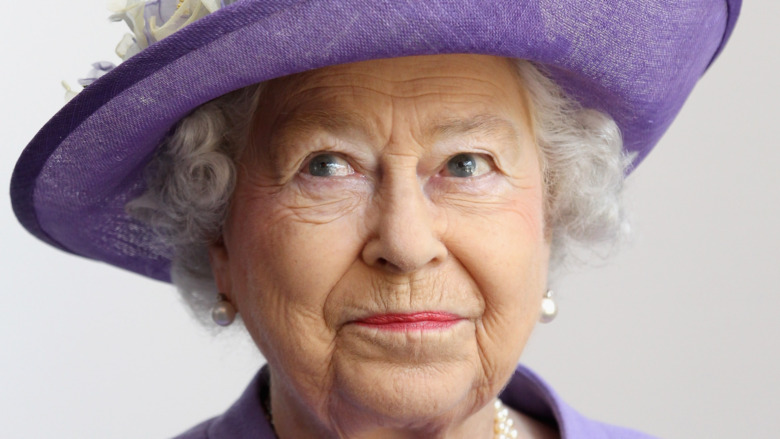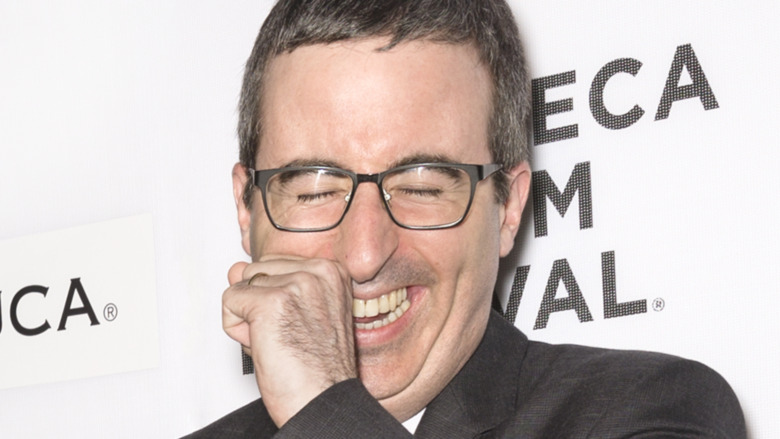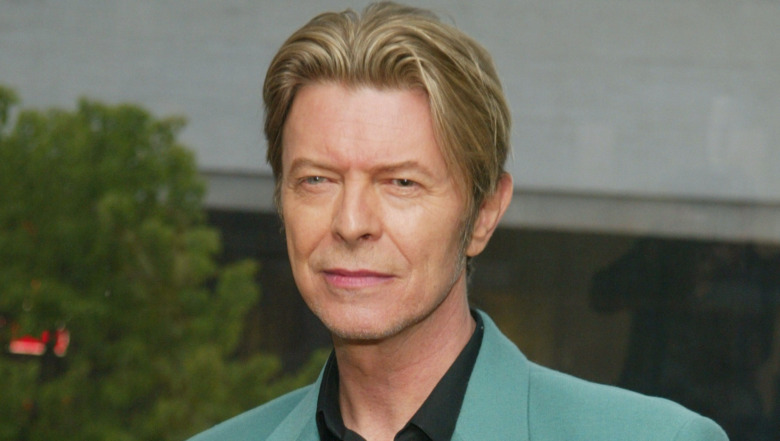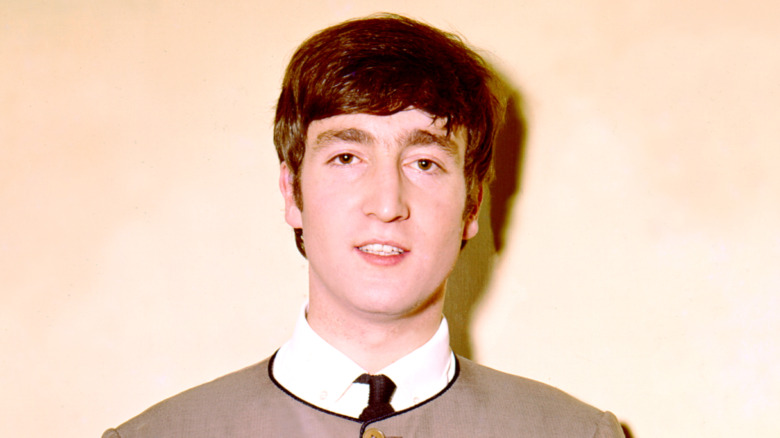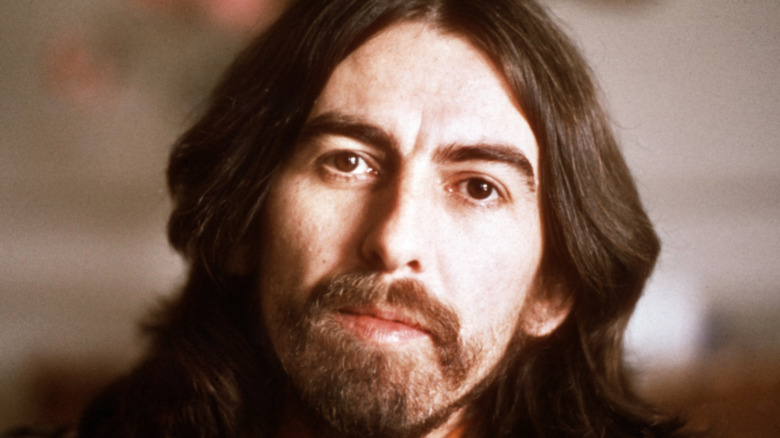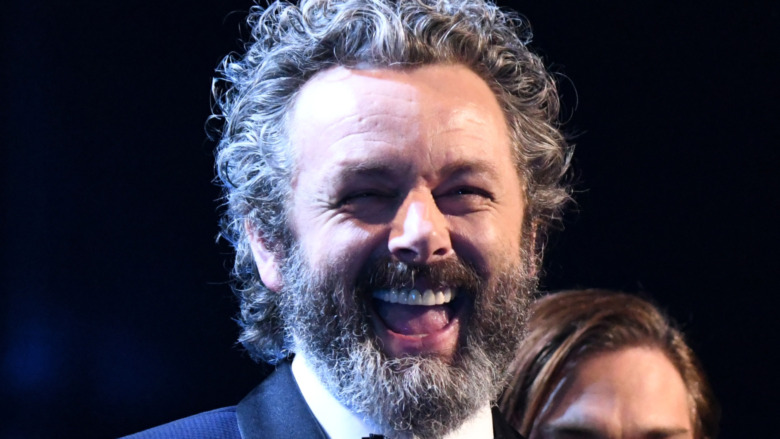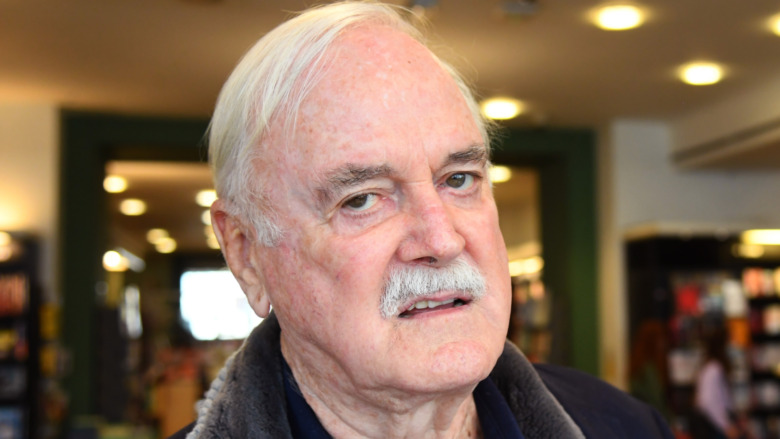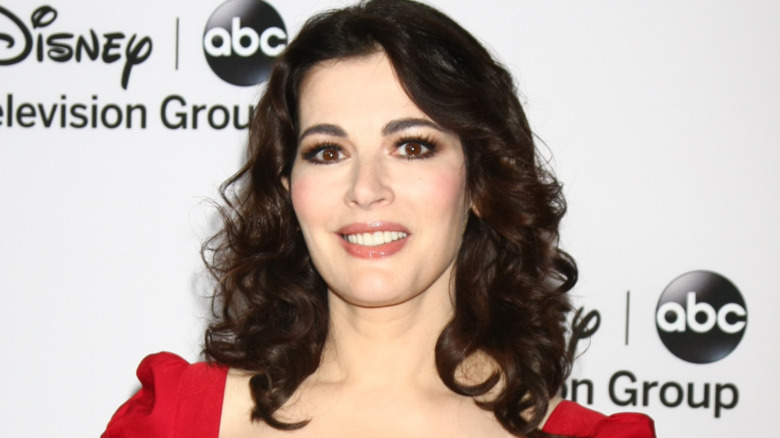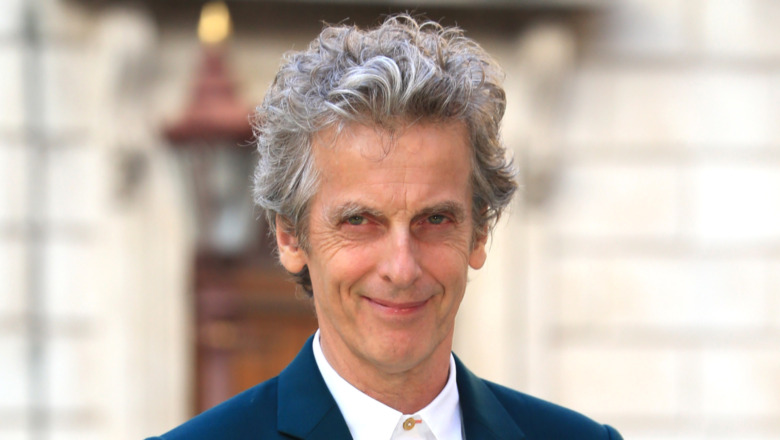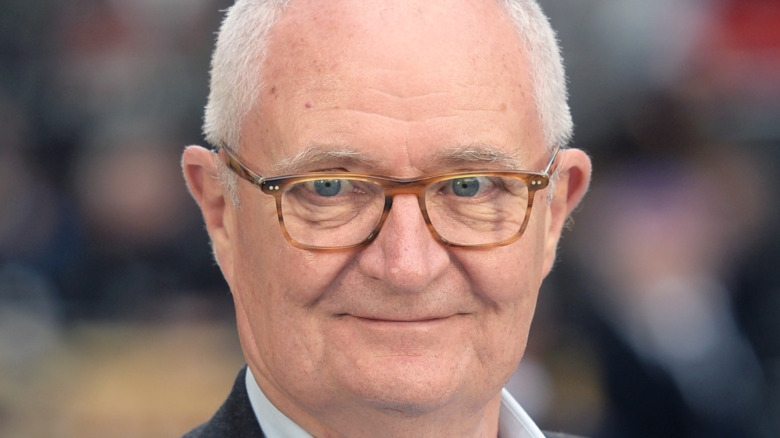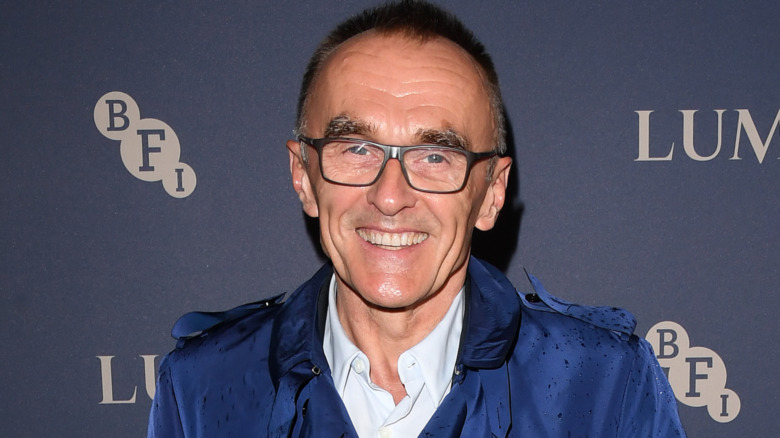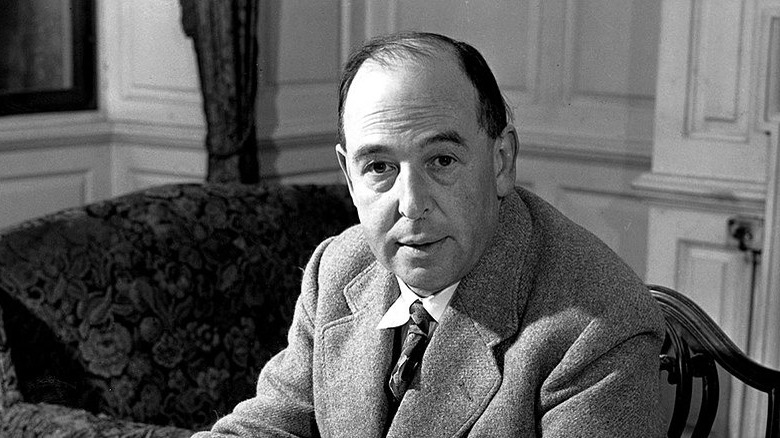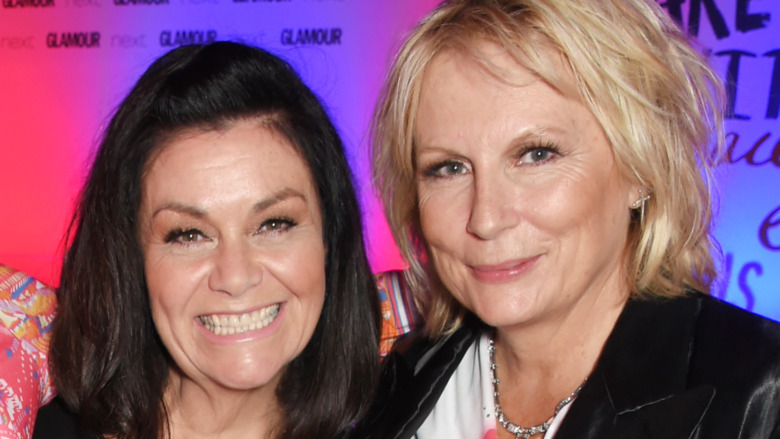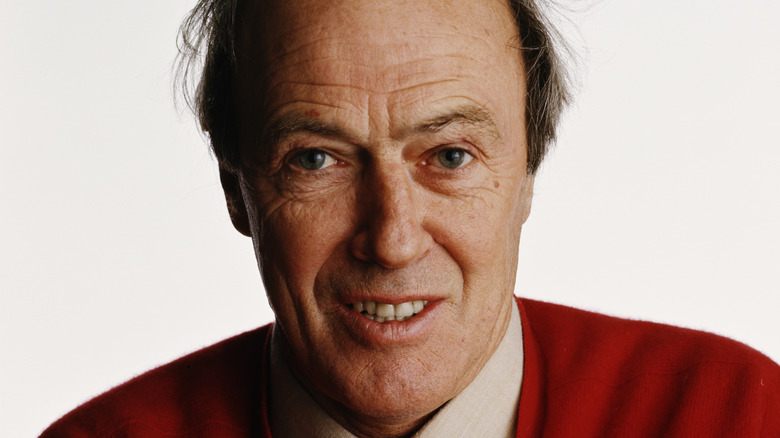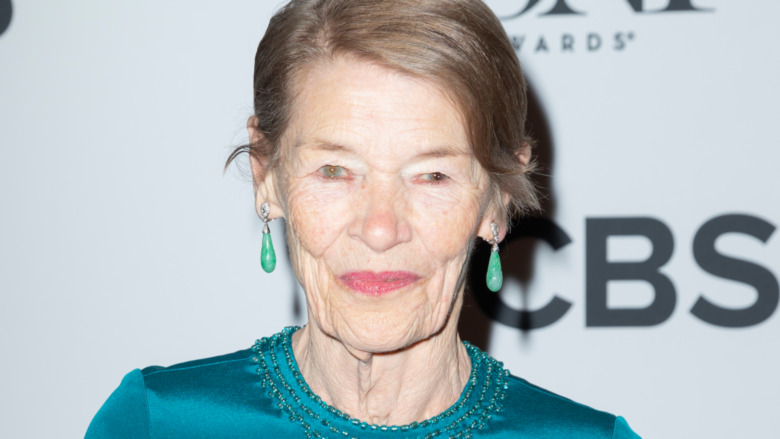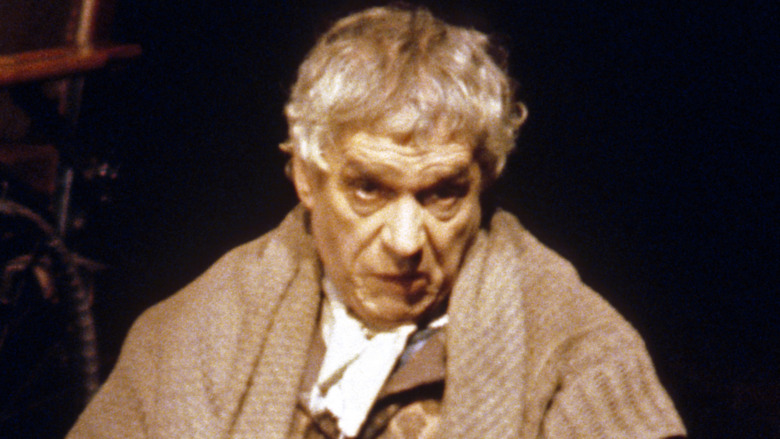Celebrities Who Turned Down Honors From Queen Elizabeth
The ancient feudal system of lords, ladies, dukes and duchesses, knights, dames, aristocrats, peers, and commanders is alive and well in the modern-day United Kingdom. One of the duties and privileges afforded Queen Elizabeth II, the ceremonial figurehead monarch of the British realm, is bestowing showy titles on prominent individuals born in one of the countries that make up the U.K. — England, Scotland, Wales, and Northern Ireland. The queen and her officials can recognize and appreciate the contributions to the world of any Briton, even those in arts, culture, and entertainment, by making them a Sir, a Dame, or a member of the Order of the British Empire, for example.
Twice annually, around the time of the New Year and in October to commemorate her birthday, Elizabeth issues her "honours" list and hands out a new line of titles to those deemed worthy. But the recipients also have to want them — because sometimes they don't, for any number of reasons. Here are some famous British people who said no ma'am to Queen Elizabeth when they were offered an otherwise highly coveted honorific.
John Oliver had no interest in an honor from Queen Elizabeth
A gig as a correspondent on "The Daily Show" launched several comedians to mega-fame, including Steve Carell, Stephen Colbert, and John Oliver. While simultaneously co-starring as a lazy college professor on "Community," Oliver turned in sardonic, witty reports for Jon Stewart's flagship series, often interpreting news from his native U.K. as the show's "Senior British Correspondent," per The Guardian. After multiple Emmy wins for helping to write "The Daily Show," Oliver departed to host his own satirical news show, "Last Week Tonight," for HBO, and he's continued to rack up those Emmys.
In 2019, Oliver was a guest on the podcast, "Conan O'Brien Needs a Friend" (via Chortle), where he related the tale of how the British consulate called him in New York to ask if he'd like to be made a member of the Order of the British Empire. The stand-up comedian said that he remembered thinking that it "would be an experience" to visit Buckingham Palace, but then before long, his true feelings bubbled up.
"Then what kicks in is, 'Oh no I don't want that at all,'" Oliver explained. "'I don't want an Order of the British Empire. Why on earth would I want that?' Then I looked up all the people who rejected it." Coincidentally, that's where we come in.
David Bowie thought a title was an oddity
David Bowie was a musician and an actor, but those highly specific labels don't really do the man justice. He was more of a performance artist, a man who did his own thing for more than 40 years, changing his public persona to suit the project. For a while, he presented himself as Ziggy Stardust, a folk music-versed alien. And then he was the icy and stylish "Thin White Duke." This is all to say nothing of 1980s-era hit-machine Bowie, churning out danceable classics like "Modern Love."
As one of the most important, popular, and prominent artists and entertainers ever produced by the U.K., Bowie was a logical consideration for some kind of official crown honors, but he turned it down — twice. In 2000, per the Independent, he passed on being named a Commander of the Most Excellent Order of the British Empire (CBE). Three years later, Bowie declined a knighthood.
"I would never have any intention of accepting anything like that," the non-Sir David Bowie told The Sun at the time (via Bowie Wonder World). "I seriously don't know what it's for. It's not what I spent my life working at."
John Lennon told the queen to get back
The most successful rock band of all time is also an English rock band: The Beatles, formed in the city of Liverpool before conquering the world and changing the face of music in the 1960s. At the peak of the group's fame in 1965, every member of the Fab Four — John Lennon, Paul McCartney, George Harrison, and Ringo Starr — were each individually cited in Queen Elizabeth's birthday honors as Members of the British Empire, according to BBC News.
In 1969, Lennon would break apart from The Beatles (who would permanently split the following year) in more ways than one. He released the solo single "Cold Turkey," for example, and he also sent back his MBE title. His reasons were many. First, the "Give Peace a Chance" singer-songwriter opposed interference in wars in Nigeria and Vietnam, and he also had sour grapes about the lack of public response to his early solo musical efforts.
"I am returning this MBE in protest against Britain's involvement in the Nigeria-Biafra thing, against our support of America in Vietnam, and against 'Cold Turkey' slipping down the charts," Lennon wrote in a letter to Queen Elizabeth (via BBC News). "With love. John Lennon of Bag."
George Harrison wanted something more
All four members of The Beatles were honored as Members of the British Empire in 1965, according to BBC News. While the band was relatively new to the world stage (they'd scored their first big hit in 1962 with "Love Me Do"), the Fab Four was fast-tracked to royal recognition because the Harold Wilson, the U.K.'s prime minister at the time, represented the Fab Four's hometown of Liverpool.
The Beatles obviously proved they were the real deal, eventually scoring 17 No. 1 singles in the U.K., with all four musicians going on to nab enough solo success that they'd all be individually enshrined in the Rock and Roll Hall of Fame. But one other honor would go to just two Beatles: In 1997, Paul McCartney was knighted, and in 2018, Ringo Starr added a "Sir" to his name. John Lennon was likely not offered the opportunity because he returned his MBE in 1969 (and then died in 1980).
That leaves George Harrison, the "Quiet Beatle," the one who introduced Eastern musical motifs to the band's sound, and who sang and played guitar on a number of '70s and '80s classic solo hits like "My Sweet Lord," "What is Life," and "Got My Mind Set on You." According to Express, Harrison was set to have his MBE upped to an Order of the British Empire title in 2000. He reportedly declined, finding his MBE to be sufficient.
Michael Sheen picked speaking his mind over an OBE
Michael Sheen has often portrayed British icons on the big screen, such as Prime Minister Tony Blair in "The Queen" and journalist David Frost in "Frost/Nixon." He's also been all over American TV, with a recurring role as a British fussbudget named Wesley Snipes on "30 Rock," real-life sex researcher William Masters on "Masters of Sex," and a current starring part on the Fox drama, "Prodigal Son."
In 2009, Sheen, a native of U.K. constituent country Wales, received an Order of the British Empire award, ostensibly for his acting work and additions to culture and the arts. However, he later renounced the honor. Back in 2017, the "Good Omens" star delivered the annual Raymond Williams Memorial Lecture at the Learning and Work Institute in Cardiff, Wales. The subject: "Who speaks for Wales?"
"In my research to do that lecture, I learned a lot about Welsh history," Sheen told journalist Owen Jones (via USA Today). "I remember sitting there going, 'Well I have a choice: I either don't give this lecture and hold on to my OBE or I give this lecture and I have to give my OBE back.'" In order to freely criticize and critique the British government and its attitudes toward Wales, and not "be a hypocrite," Sheen chose free speech and gave back the OBE.
Peerage is the winter of John Cleese's discontent
John Cleese made his voice heard, and it was one of the strongest and most distinct voices in 20th-century comedy. As one of the leaders of the Monty Python comedy troupe, Cleese mixed high-minded literary smarts with abject and unrelenting silliness, on display in the 1969-74 British sketch comedy series, "Monty Python's Flying Circus." The group continued to poke fun at institutions in films like "Monty Python's Life of Brian" and "Monty Python and the Holy Grail," then mostly went their separate ways so that its members could do their own thing. Cleese, for example, co-wrote the film "A Fish Called Wanda," earning himself an Oscar nomination.
For his staggering and influential contributions to comedy, the British government has twice tried to honor Cleese, and twice the funnyman has rejected those attempts. According to The Telegraph, Cleese was given the chance to become a Commander of the Most Excellent Order of the British Empire, as well as offered life peerage, or a barony, which came with a hereditary seat in the House of Lords chamber of Parliament. Cleese found it all to be "silly," and quipped that he didn't want the barony, because serving in Parliament would require him "to spend winters in England."
Nigella Lawson won't say why she won't title up
Before Nigella Lawson's various U.K.-originating programs, like "Nigella Bites," "Nigella Express," and "Nigella Feasts," cooking shows on both sides of the Atlantic Ocean were a fairly straightforward and blunt affair, shot in a studio kitchen under harsh lights with a trained chef barking instructions. Lawson, a self-described "home cook," food writer, and mother, revolutionized the form, presenting herself as a cheeky and witty friend, casually working her way through cinematically shot recipes in her own kitchen with the camera lingering on her flirty glances as much as it did her bubbling pots of comfort food.
One thing Lawson didn't do was receive an honorific title from Queen Elizabeth, but she says she didn't exactly reject one, because that's not how these things work. "I didn't really turn it down. That sounds too active and very ungracious," she told the Independent.ie. "The reality is you're never really offered one. They send out feelers." As to why she rejected those feelers, then, Lawson cryptically said, "If you feel you have to advertise why you turned down something, you may as well accept it."
The only lord Peter Capaldi wants to be is a time lord
Born in Scotland, Peter Capaldi became a prolific institution in British television. Appearing in more than a hundred projects since the early 1980s, he's certainly best known for portraying one of the iterations of the titular godlike Time Lord on the BBC's long-running "Doctor Who," as well as John Frobisher on the spinoff "Torchwood," and turning in memorable performances on the dark hospital-set comedy, "Getting On," and the profane political satire, "The Thick of It."
In a 2017 interview with the U.K.'s Sunday Times Magazine (via the Mirror), Capaldi strongly suggested that he'd been offered a Queen's honor at some point in the past, due to his many contributions to British culture and television, but that he had said "no thank you" to the idea. "I'm not really that interested," Capaldi explained. "I think it's lovely that people get them but it's not really my thing."
Jim Broadbent would've let his father down if he'd accepted Queen Elizabeth's honor
Featuring a couple generations of notable English actors, the "Harry Potter" film franchise is lousy with Academy Award-winning actors, including Gary Oldman, Maggie Smith, Emma Thompson, Eddie Redmayne, and Jim Broadbent. In 2002, a few years before he'd play Professor Horace Slughorn for the first time, Broadbent won an Oscar for the biopic, "Iris," playing John Bayley, a writer, husband of novelist Irish Murdoch, and holder of the title Commander of the Most Excellent Order of the British Empire, per The Guardian. It was an honorific that Broadbent would not share, a choice which was entirely up to him.
The actor, also widely known for his work in "Moulin Rouge!", "Paddington," "Gangs of New York," "Hot Fuzz," and "Game of Thrones," was recommended to be named a member of the Order of the British Empire shortly after his Oscar win. "I didn't think it would suit me," Broadbent told The Guardian. "I've been fairly selfish with everything I've done and I get enough prizes elsewhere and I didn't think I deserved it, really." Broadbent also figured that his late father, who possessed "an anarchic spirit," may "have been proud of me to have turned it down."
Danny Boyle wants to live like common people
The year 2012 was a big one for the U.K. London hosted the Summer Olympics, and they kicked off with a massive, partially filmed opening ceremony that celebrated Britishness, including appearances from Daniel Craig as English super-spy James Bond, and Her Majesty, Queen Elizabeth II herself. The short movie was directed by Manchester native Danny Boyle, the Academy Award-winning filmmaker of "Slumdog Millionaire," who built up his reputation and resume as the director of dark, edgy, cult-beloved films like "Trainspotting," "28 Days Later...", and "Shallow Grave."
When the queen released her list of New Years Honours at the end of 2012, many recognized were those who helped make the Summer Olympics such a success, according to The Guardian. Boyle wasn't among them, but he was supposed to be. According to The Sunday Times (via ITV), Elizabeth offered Boyle a knighthood. Instead, the would-be Sir Boyle stayed Mr. Boyle, so as to remain "a man of the people." As the director, who's been critical of the royals in the past, explained on the radio show, "Front Row" (via The Guardian), he's "very proud to be an equal citizen."
C.S. Lewis thought he was too common for royal recognition
There likely wouldn't be the modern fantasy novel — or subsequent fantasy film or television adaptations — exemplified by "Game of Thrones" or "Harry Potter" if C.S. Lewis hadn't laid the groundwork in the 1950s with his "The Chronicles of Narnia" saga. Those seven books are set in the mystical, mythical, talking animal-populated magical land of Narnia, first accessed by a magical wardrobe by four children in World War II-era England. Narnia contained a robust element of Christian allegory, understandable and logical as Lewis was an Oxford University professor and author of popular theological titles, including "Mere Christianity" and "The Screwtape Letters."
After World War II, Lewis was offered the highest civilian honor short of a knighthood: Commander of the Most Excellent Order of the British Empire. Lewis, forever the brainy, chatty, professor and thinker, had a lengthy explanation for why he turned down that MBE. In a letter to his brother published after his death (via The American Interest), Lewis that said "royalty is to be reverenced, and if you begin to poke about it you cannot reverence it," adding that such titles he was offered kill "the charm of royalty" and "let in daylight upon magic."
Dawn French and Jennifer Saunders thought accepting a proper title would be improper
To American audiences, the British comedy duo of Dawn French and Jennifer Saunders are likely better known for their work apart from each other. For example, French portrayed the small-town Church of England minister Geraldine Granger on the oft-rerun Britcom, "The Vicar of Dibley," and the living "Fat Lady" painting in the Harry Potter franchise, while Saunders will likely forever be associated with her role as the shockingly debased and libertine Edina on the cult classic, "Absolutely Fabulous." Both comedians became major stars in Great Britain in the late 1980s, when they worked together on their own BBC sketch series, "French and Saunders," which ran off and on for 20 years.
So beloved were the pair that, in 2001, both were considered for official royal recognition from Queen Elizabeth II. Neither accepted the Order of the British Empire title, however. "If I felt I deserved a Damehood, I'd accept it," Saunders told Source (via Metro). "At the time, we felt that we were being paid very well to have a lot of fun. It didn't seem right somehow. We didn't deserve a pat on the back. It felt a bit fake to stand alongside people who devoted their lives to truly worthy causes."
Roald Dahl didn't think a title was so peachy
It's no overstatement to say that Roald Dahl is one of the most-read and beloved authors in the English language. Boasting a distinctively British sensibility, kids all over the world and for decades now have delighted in his books, which combined the despair and cruelty faced by the kinds of child characters readers would have previously found in the works of Charles Dickens, and gave them happy endings via magic and fantastical situations. Some of Dahl's best-known and best-selling works: "Charlie and the Chocolate Factory," "The BFG," "Matilda," and "James and the Giant Peach."
As a very successful icon of British literature, Dahl was certainly a worthy recipient of recognition from Her Majesty. In fact, Queen Elizabeth II did offer Dahl the opportunity to be amongst the Order of the British Empire in 1986, according to Bucks Free Press. The author passed on the chance, however, and died four years later.
Glenda Jackson only wants to play fictional dames
Glenda Jackson served the United Kingdom and enriched life in the nation in two separate, distinct, and disparate ways. In the 1960s and 1970s, she was one of the most acclaimed actors on the planet, carrying films like "Sunday Bloody Sunday," "Hedda," "Women in Love," and "A Touch of Class," all of which earned her Academy Award nominations for best actress, and the last two won Jackson the award. She also won an Emmy Award for portraying Queen Elizabeth I in the 1971 miniseries, "Elizabeth R," and starred in numerous productions for London's most storied stages and Broadway, too. In 2018, she won a Tony Award for "Three Tall Women."
However, Jackson was away from the stage and screen for large chunks of time, seeing as how she was busy serving as a Member of Parliament, representing the Hampstead area of London from 1992 to 2015.
While named a Commander of the Most Excellent Order of the British Empire in 1978, Jackson doesn't want anything more regal than that surrounding her name. "I'd only want to be a dame if it was in panto," she told the Evening Standard in 2017, referring to the very British form of theatrical musical comedy called pantomime, meaning she only wants to play titled women, not be one.
Paul Scofield stopped just short of knighthood
Paul Scofield primarily worked in the British theater system — specializing in Shakespearean tragedies like "Macbeth," "Othello," and "King Lear," per the Los Angeles Times. He only relatively occasionally took on film and TV roles over a 50-year career. Among his most notable screen work: He played the ghost of the dead king in Mel Gibson's 1990 film version of "Hamlet," a cruel judge in the 1996 adaptation of "The Crucible," and Sir Thomas Moore, who opposed King Henry VIII's expulsion of the Catholic Church from England, in the 1966 film, "A Man for All Seasons." That won Scofield his only Academy Award, although he'd be nominated in 1995 for his supporting role in "Quiz Show."
Back in 1955, Scofield portrayed "Hamlet" in a production so legendary and well-received that he toured it through Russia when it was under strict communist rule. Immediately after, Scofield accepted the offer to be a Commander of the Most Excellent Order of the British Empire, and in 2001, seven years before his death, he was named to the Order of the Companions of Honour.
And yet Scofield refused a knighthood on several occasions. "It is just not an aspect of life that I would want," Scofield explained (via the Los Angeles Times). "If you want a title, what's wrong with Mr.?"

